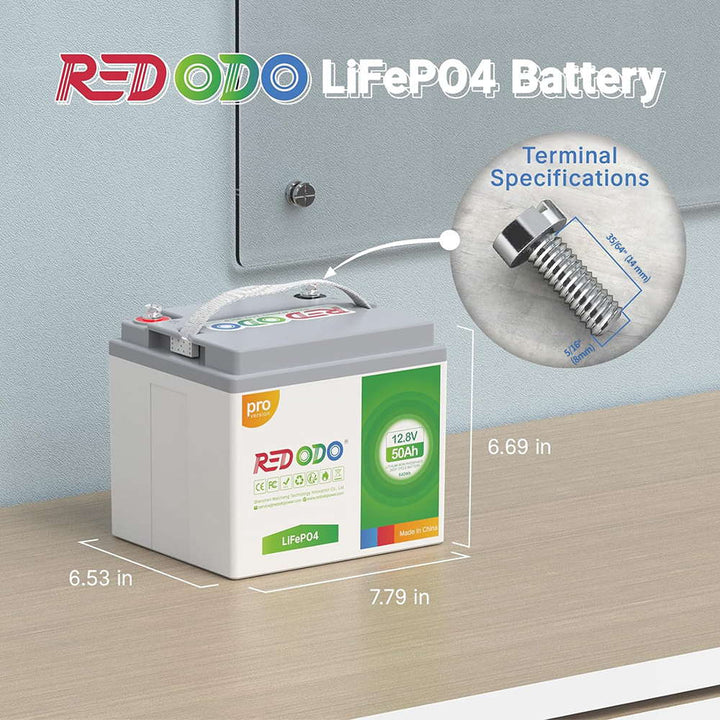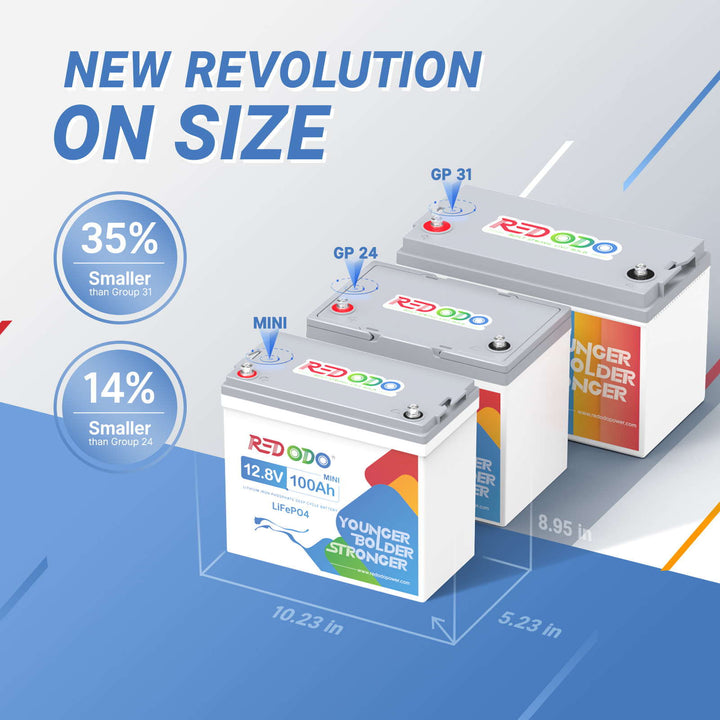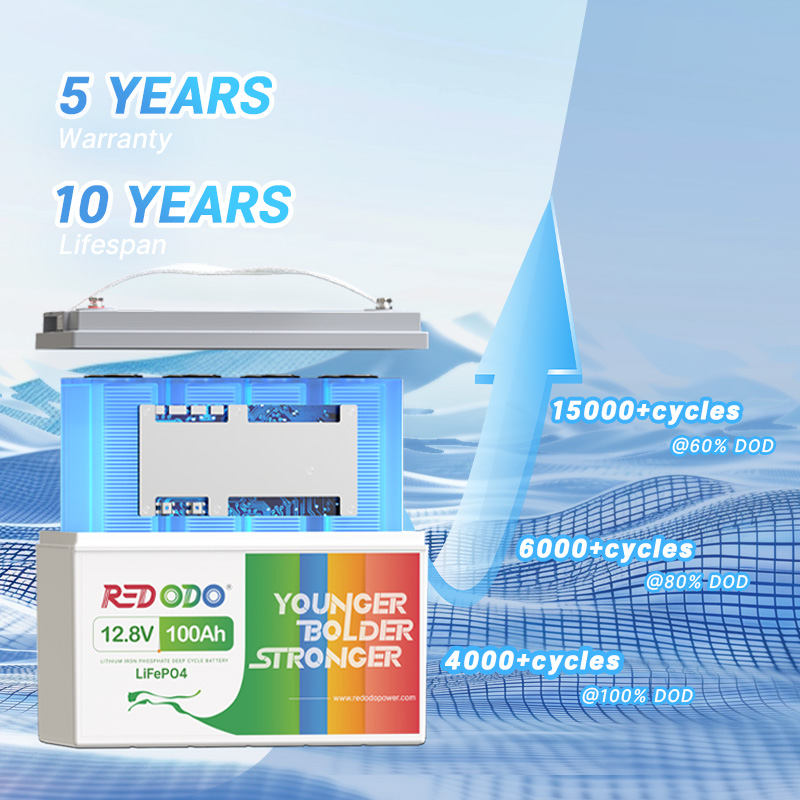What are the Differences between LiFePO4 and Lithium-ion Batteries? Is LiFePO4 better than lithium-ion?
LiFePO4 and Lithium-ion batteries are both rechargeable batteries that use lithium ions to power electrical devices. However, these batteries have some differences.
Table of Content
LiFePO4 Batteries
LiFePO4 batteries are a special kind of lithium-ion batteries. They use a unique chemistry that makes them better than other lithium technologies. LiFePO4 batteries are becoming more common and are used for power solutions in devices like Redodo LiFePO4 lithium batteries.
LiFePO4 gets its name from the chemicals in the cathode, which is made from lithium iron phosphate (LiFePO4). The anode is carbon, and the electrolyte is made from a lithium salt in an organic solvent.
The chemistry in LiFePO4 batteries makes them safer than other lithium-ion batteries. This is because of the strong bonds created by iron, phosphorous, and oxygen atoms in the cathode. As a result, the battery is more stable and less likely to overheat.
Importantly, LiFePO4 batteries don't use nickel or cobalt, which is good because these metals are in short supply and may have questionable sourcing.
Lithium Ion Batteries
Lithium-ion batteries come in a few different types like lithium iron phosphate (LiFePO4), lithium manganese oxide (LMO), and lithium cobalt oxide (LiCoO2). They all have three different parts: a cathode, an anode, and an electrolyte. The electrolyte in these batteries is made from lithium salt, and the anode is made from carbon. However, the cathode is where the lithium batteries differ based on the type of lithium metal oxide inside it and its specific composition.
The charging and discharging processes for all types of lithium-ion batteries are the same. When the lithium ions move from the cathode to the anode, the electrons move in the opposite direction. This creates an electrical current.
Key Differences Between LiFePO4 and Lithium-ion Batteries
When choosing between Li-ion and LiFePO4 batteries, it's important to consider the specific requirements of your application, such as voltage, capacity, discharge rate, lifespan, and safety. Depending on your needs, either type of battery may be suitable for your application.
Safety
Both LiFePO4 (Lithium Iron Phosphate) and Li-ion (Lithium-ion) batteries are commonly used in many electronic devices due to their high energy density, lightweight, and long cycle life. However, there are differences in terms of safety aspects:
- Thermal stability: LiFePO4 batteries have higher thermal stability as compared to Li-ion batteries. They are less prone to overheating and thermal runaway, making them a safer option.
- Chemical stability: LiFePO4 batteries are less prone to a chemical reaction that can cause thermal runaway compared to Li-ion batteries. This is because the LiFePO4 cathode is more stable and less reactive than the LiCoO2 cathode in Li-ion batteries.
- Overcharging: Overcharging or incorrect charging can lead to a short-circuit or battery failure. LiFePO4 batteries have a higher tolerance for overcharging compared to Li-ion batteries, making them less prone to catastrophic failures.
- Disposal: Both LiFePO4 and Li-ion batteries are hazardous materials and require proper disposal. However, LiFePO4 batteries are considered less hazardous to the environment because they contain fewer toxic chemicals.
Energy Density
When it comes to energy density, lithium-ion batteries tend to have a higher energy density compared to LiFePO4 batteries. Energy density refers to the amount of power that a battery can store per unit of weight or volume. Li-ion batteries can contain more energy per weight or volume unit than LiFePO4 batteries.
For example, a typical Li-ion battery can store 100-265 Wh/kg , while a LiFePO4 battery can store around 125-160Wh/kg. However, it's important to note that the energy density range for Li-ion batteries varies depending on the different types of lithium-ion batteries available in the market. Some are only suitable for specific applications such as electric cars.
Despite this difference in energy density, LiFePO4 batteries are still considered superior in off-grid power solutions. This is because their slightly lower energy density becomes insignificant as the power solutions become larger and more stationary. In such scenarios, the longer lifespan, better safety features, higher discharge rates, and overall reliability of the LiFePO4 batteries outweigh their lower energy density.
For example, electric vehicles powered by a 60 kWh Li-ion battery pack can travel up to 230 miles on a single charge. The same vehicle using an LFP battery with the same capacity would have a range of up to 180 miles. While this results in a decrease in range, it's important to note that LFP batteries are still a viable option for many applications where high energy density is not the top priority.
When it comes to off-grid power solutions, LiFePO4 batteries continue to be the most suitable choice, even though their energy density may be slightly lower than that of Li-ion batteries. For larger stationary power solutions, the difference in energy density between the two becomes insignificant.
Weight
The weight of a battery bank may be influenced by its energy density, as previously mentioned. While LiFePO4 battery banks may weigh slightly more than comparable Li-ion batteries, some LFPs can be lighter due to their use of lightweight metals in construction.
Regardless of slight variations in weight, the advantages of using LiFePO4 batteries outweigh any differences in weight. For off-grid and solar applications, safer and long-lasting technologies like LiFePO4 are preferred over Li-ion batteries with higher energy densities that pose safety risks.
When it comes to home power solutions, safety is a top priority, and the small difference in weight between LFPs and Li-ion batteries should not compromise safety. Moreover, LFPs remain incredibly lightweight despite their impressive power capacity. For instance, Redodo 12V 100Ah Mini LiFePO4 battery has the energy capacity on 1.28kWh while it weighs only 19 lbs.
Self-Discharge Rate
Self-discharge refers to the rate at which a battery loses its charge in storage or when not in use. A lower self-discharge rate means that the battery will retain more of its charge over time, making it more suitable for applications where long-term energy storage is required.
LiFePO4 batteries have a very low self-discharge rate, typically less than 1% - 3% per month, which makes them an ideal choice for applications such as solar power systems, backup power solutions, and electric vehicles that require long-term energy storage. In contrast, most Li-ion batteries have a higher self-discharge rate, ranging from 5% to 10% per month, which can result in a significant loss of stored energy if the battery is left unused for an extended period.

Another factor that affects the self-discharge rate is the temperature at which the battery is stored. Higher temperatures can accelerate the self-discharge rate, which can reduce the capacity and lifespan of the battery. Therefore, it's important to store batteries in a cool and dry environment to minimize self-discharge and extend their lifespan.
Overall, LiFePO4 batteries offer a significantly lower self-discharge rate than most Li-ion batteries, making them an excellent choice for applications that require long-term energy storage with minimal loss of stored energy.
Voltage
Li-ion and LiFePO4 batteries have different nominal voltage ratings - typically 3.6-3.7V per cell for most Li-ion batteries, while LiFePO4 has a nominal voltage of around 3.2V per cell. This means that to achieve the same output voltage, LiFePO4 batteries require more cells to be connected in series.
For example, a typical 12V Li-ion battery will have 3 or 4 cells connected in series, while a 12V LiFePO4 battery requires 4 or 5 cells to reach the same voltage. While this can result in slightly higher weight and size for LiFePO4 batteries, it also provides several advantages such as greater safety, longer lifespan, and wider operating temperature range.
It's important to note that even though LiFePO4 batteries have a lower nominal voltage than Li-ion batteries, they can deliver a higher discharge current without significant voltage drop. This is because LiFePO4 batteries have a lower internal resistance, allowing them to deliver high power output with minimal energy loss.
Temperature Range
LiFePO4 batteries have a wider operating temperature range than most Li-ion batteries. They can operate safely in temperatures ranging from -20°C to 60°C (-4°F to 140°F) without significant degradation in performance or safety risks. In contrast, the typical operating temperature range for most Li-ion batteries is around -20°C to 45°C (-4°F to 113°F). Exposing Li-ion batteries to temperatures outside of this range may cause permanent damage to the battery, decrease its capacity, or even create safety hazards such as leakage, fire, or explosion.
While LiFePO4 batteries have a wider operating temperature range, they also have a relatively lower energy density compared to other types of lithium-ion batteries. This means that they may require a larger footprint or more weight to achieve the same level of power output as a comparable Li-ion battery with higher energy density.
In summary, LiFePO4 batteries offer superior temperature stability and safety but may require larger physical space or additional weight to achieve comparable performance to Li-ion batteries with higher energy densities. When choosing a battery, it's important to consider factors such as application, operating environment, available space, and performance requirements to determine the best option for your specific needs.
Lifespan
Most Li-ion batteries can undergo approximately 500 charge and discharge cycles before their performance starts to decline. In contrast, LiFePO4 batteries can endure thousands of cycles before exhibiting any significant loss of capacity or performance. For example, Redodo’s LiFePO4 battery can endure 4000-15000 cycles, which means they can be served for more than 10 years.
This is due to their more stable chemistry, which results in fewer chemical reactions and less degradation over time.
In addition, LiFePO4 batteries are designed to be cycled more frequently than Li-ion batteries without experiencing significant capacity loss. This makes them ideal for applications such as solar energy storage and electric vehicles that require frequent charging and discharging cycles.
On the other hand, while Li-ion batteries have a shorter overall lifespan compared to LiFePO4 batteries, they can still provide many years of use before requiring replacement. The lifespan of a Li-ion battery depends on several factors, including discharge rate, operating temperature, and the number of charge and discharge cycles.
In summary, LiFePO4 batteries offer a longer lifespan than most Li-ion batteries, making them a better choice for applications that require frequent charging and discharging cycles and long-term energy storage. However, both types of batteries can provide reliable performance for many years, depending on the specific requirements of your application.
Cost
LiFePO4 batteries are generally more expensive than most Li-ion batteries. This is due to the higher cost of raw materials used in their production, as well as the manufacturing process required to create them. In addition, LiFePO4 batteries typically require more cells in series to achieve comparable voltage and capacity, which can add to the overall cost.
On the other hand, LiFePO4 batteries have a longer lifespan and require less maintenance compared to most Li-ion batteries, making them a good choice for applications that require long-term energy storage with minimal maintenance. For example, a Redodo 12V 100Ah LiFePO4 battery costs $319.99, but it can be used for more than 10 years, so the cost of the battery per day is approximately $0.09
Comparing Lifepo4 and Lithium-Ion Batteries in Practical Scenarios
Both LiFePO4 and lithium-ion batteries have a wide range of real-world applications, and the choice between them depends on the specific application and its requirements.
LiFePO4 batteries are commonly used in applications that require a high level of safety and stability. For instance, they are used in electric vehicles because of their high energy density, long cycle life, and excellent thermal stability. They are also used in medical devices, backup power systems like RV, marine, and solar power systems, where safety is a top priority.

On the other hand, lithium-ion batteries are widely used in portable devices such as smartphones, laptops, and cameras because of their high energy density, lighter weight, and smaller size. They are also used in electric cars and hybrid vehicles.
In summary, LiFePO4 batteries are ideal for applications where safety is critical, while lithium-ion batteries are ideal for applications that require high energy density and lightweight.
To Sum Up
Both LFP and Li-ion batteries are widely used nowaday. The choice between LiFePO4 and lithium-ion batteries depends on the specific needs and requirements of the application.
Therefore, understanding the differences and similarities between LiFePO4 and lithium-ion batteries is crucial in selecting the best battery for a given application.
Redodo is a leading manufacturer of LiFePO4 deep cycle battery. You can expect safe, reliable, and long-lasting products with LiFePO4 batteries
FAQs on LiFePO4 vs. Lithium-ion Battery
Why is LiFePO4 so expensive?
LiFePO4 batteries are more expensive than traditional lithium-ion batteries, due to the cost of materials like iron phosphate, a more complex and costly manufacturing process, and the need for more materials to achieve the same energy capacity.
Can I replace Li-ion with LiFePO4?
Replacing lithium-ion batteries with LiFePO4 is possible, but you need to ensure voltage compatibility, as LiFePO4 batteries have a lower nominal voltage. Also, ensure your charger is compatible with LiFePO4 chemistry, and consider if your application prioritizes safety, long cycle life, and thermal stability.
What are the disadvantages of LiFePO4?
LiFePO4 batteries come with a higher initial cost and are not as widely available. Additionally, they have a lower nominal voltage (3.2V) compared to other lithium-ion cells (3.6-3.7V).
Are LiFePO4 batteries more environmentally friendly?
Yes, LiFePO4 batteries are generally more environmentally friendly compared to other lithium-ion batteries. They use non-toxic materials like iron and phosphate, reducing the environmental impact during production and disposal. Additionally, their longer cycle life means fewer batteries are needed over time, contributing to less waste.
What are the best applications for LiFePO4 batteries?
LiFePO4 batteries are best suited for applications where safety, long cycle life, and thermal stability are critical. These include renewable energy storage systems, electric vehicles, marine and RV applications, and backup power systems. Their robust performance in various environmental conditions makes them ideal for these uses.
Learn more about
Factors Affect The Lifespan of LiFePO4 Batteries
7 Advantages to Upgrade RV System with LiFePO4 Batteries
LiFePO4 Battery Management System: Improving Battery Performance and Safety

Redodo

Redodo
Recent Post

How Long Will a 100Ah Battery Run an Air Conditioner?

A Full Review of Redodo 12V 140Ah Group 31 Deep Cycle Battery

How Much Does it Cost to Replace Golf Cart Batteries?

What Size Fish Finder Battery Do I Need? 2025 Updated




![⚡[$165 after Sign-Up] Redodo 12V 100Ah LiFePO4 Lithium Battery | Best Budget | For RV, Solar, Trolling Motor](http://www.redodopower.com/cdn/shop/files/Redodo_12v_100ah_lithium_battery_b9015ddd-64b5-4be2-8c88-392f0bb4ab30.jpg?v=1742973160)
![⚡[$161 after Sign-Up] Redodo 12V 100Ah Group 24 Deep Cycle LiFePO4 Lithium Battery | 20% Smaller | For Home, RV, Marine](http://www.redodopower.com/cdn/shop/files/group_24_3255e3e9-409d-412d-8871-4f05861a5c1e.jpg?v=1742968223)
![⚡[$184 after Sign-Up] Redodo 12V 100Ah Group 24 Bluetooth LiFePO4 Battery | Real-Time Battery Monitoring | For RV, Marine, Solar](http://www.redodopower.com/cdn/shop/files/group_24_BT_312a5c81-ec74-4307-a7f5-c05e195d5246.jpg?v=1742971855)
![⚡[$184 after Sign-Up] Redodo 12V 100Ah Group 31 Bluetooth Lithium Battery | Real-Time Battery Monitoring | For RV, Marine, Solar](http://www.redodopower.com/cdn/shop/files/GROUP_31_0501cb0c-ed50-4c4a-b78e-b7ab501d90b4.jpg?v=1742971970)
![⚡[$198 after Sign-Up] Redodo 12V 100Ah Mini Lithium LiFePO4 Battery | Smallest Battery | For RV, Trolling Motor, Solar](http://www.redodopower.com/cdn/shop/files/Redodo12V100AhMiniLiFePO4LithiumBattery.jpg?v=1739959054)
![⚡[$220 after Sign-Up] Redodo 12V 100Ah Self-Heating Lithium Battery | For RV, Boats, and Solar Home Systems](http://www.redodopower.com/cdn/shop/files/Redodo_12V_100ah_self-heating_battery.jpg?v=1740478237)
![⚡[$340 after Sign-Up] Redodo 12V 200Ah Low Temp Lithium Battery | 1280W Load Power | For RV, Solar, Off-Grid](http://www.redodopower.com/cdn/shop/files/Redodo12V200Ahlowtempcutofflifepo4battery_0e3042f8-41ec-49a2-8586-705d8fa25a7c.jpg?v=1741251295)

![⚡[$450 after Sign-Up] Redodo 12V 280Ah LiFePO4 Battery | Low Temp Protection | For RV, Marine, Solar](http://www.redodopower.com/cdn/shop/files/Redodo12V280AhLowTempCutoffLiFePO4Battery.jpg?v=1741251504)
![⚡[$496 after Sign-Up] Redodo 12V 300Ah Lithium LiFePO4 Battery | Replaces 6*12V 100Ah AGM Batteries | RV, Marine, Solar](http://www.redodopower.com/cdn/shop/files/Redodo_12V_300Ah_Lithium_Battery_fe27f603-e18b-4c4a-9105-848685f2fcdb.jpg?v=1743157570)